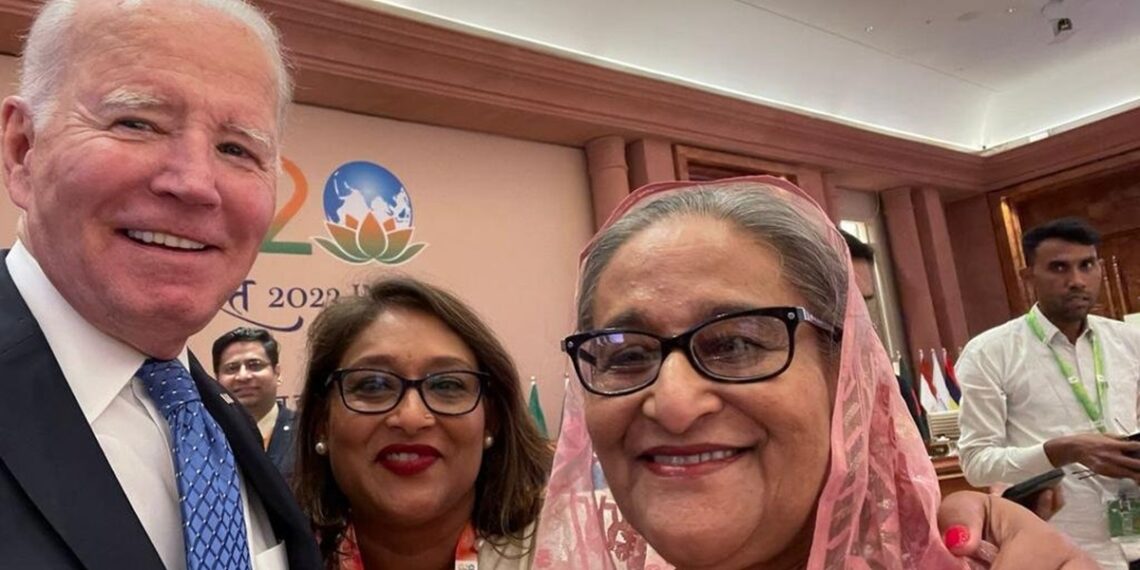Two seemingly unconnected issues involving Bangladesh emerged today: first, the acceptance of Sajeeb Ahmed Wazed Joy’s resignation as Information and Communication Technology (ICT) advisor to Prime Minister Sheikh Hasina. The resignations of two other advisors, Major General (retd) Tarique Siddique and Salman F Rahman were also accepted.
Secondly, a letter issued by a Bangladeshi diplomat at the country’s embassy in Washington DC, saying in no uncertain terms that “there are reasons to believe that Bangladesh may be one of the targets” of American sanctions related to “labor related issues”.
An examination of the first issue – Sajeeb Ahmed Wajed Joy’s resignation as the ICT advisor – suggests that either he resigned the position the very day that all other technocrat-ministers and advisors did on November 19 or he did not do so then and that his quit papers were accepted by the Prime Minister’s Office today along with those of Maj Gen (retd) Siddique and Salman Rahman.
The implication of Sajeeb Wazed’s resignation is that he will now no longer possess a diplomatic passport and therefore not have diplomatic immunity from any legal measure that American authorities might impose on him.
ALSO READ Hasina shares fears of US trade-related sanctions with leaders of two allied parties
The protective shield that he enjoyed so far will now longer be available to him and he could be dealt with as any ordinary resident in that country. For the record, he is a resident of Virginia.
Incidentally, Sajeeb Wazed reached Dhaka surreptitiously on November 17, attended a public function at Savar the following day before clandestinely leaving the Bangladeshi capital for Dubai (and onward to the US) on November 23.
He did not step out of Ganabhaban, the prime minister’s official residence, during his sojourn.
Sajeeb Wazed Joy’s secretive entry to and departure from Dhaka set tongues wagging: Was he is in the midst of a legal jam in the US? Did this legal situation necessitate the return to the US within a stipulated date? Other questions too crop up but the answers to these may yet take some time for them to be in the public realm.
ALSO READ In yet another clandestine move, Sajeeb Wazed Joy exited Dhaka today on an Emirates flight
The import of the letter (dispatched on November 20) that the Bangladeshi diplomat, Mohammad Salim Reza, wrote to a senior secretary at the Commerce Ministry in Dhaka is not lost on us. While Bangladesh’s ambassador to the US, Mohammad Imran, surfaced in New Delhi on November 24 – the same day he met Foreign Secretary Masud Bin Momen in the Indian capital – his sudden departure from Washington DC, explained away as part of long overdue earned leave, could be related to the impending sanction-related information that needed urgent deliberation senior colleagues.
Incidentally, Imran reached Dhaka on November 28.
Reza’s letter is interesting, if not alarming, in more ways than one. It says, “Labor issues in Bangladesh were specifically quoted by Secretary of State (Antony Blinken) and acting Secretary of Labor (Julie Su)…As per the ‘Memorandum’, the US foreign mission would directly interact/deal with labor issues, the policy may encourage the interested US diplomats/missions to interfere in many internal/domestic issues.
It seems that there are scopes for this policy to be imposed at individual, firm or state level, if they anticipate/believe the labors’ rights are violated”.
In his analysis, Reza wrote that “The political context of the ‘Memorandum’ has many reasons to be alarmed. Politics is behind what is said about labor rights in the memorandum, and the US would try to use the political purpose in different ways.
Therefore the ‘Memorandum’ is a signal for Bangladesh as the US may take any measure as described in the memorandum in the excuse of labor rights.
The Memorandum may also have an impact on Bangladesh’s apparel sector and it should be taken into cognizance with priority by the concerned stakeholders”.
ALSO READ US sticks to stand on Bangladesh ruling regime: Failure to comply will invite strong measures
The question uppermost in the minds of Bangladeshis – not all and certainly not all the 298 Awami League candidates who have gleefully jumped onto the electoral bandwagon – is whether the US will now deploy the two weapons together in unison or one followed by the other in the days to come?
Much will, of course, depend on the US administration, including the State Department and the Treasury Department, on when it would deploy the dual weapons against the Sheikh Hasina regime which has brazenly defied American suggestions to hold free, fair, violence-free and participatory elections.
In fact, Bangladesh Foreign Minister A K Abdul Momen and more recently the prime minister herself have mocked and pooh-pooed the American suggestions, saying that if the US imposed sanctions on Bangladesh, their country would respond in kind.
Bravado in the face of imminent crisis is actually foolhardiness. The ruling Awami League’s reckless, rash and negligent stand can cause immense hardships to ordinary Bangladeshis, a denouement that not even Sheikh Hasina’s closest friend, India, can do much to avert.















